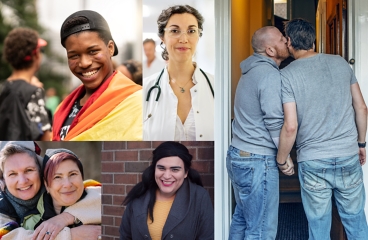LGBTQ Health
Overview

How can you get the best care?
You deserve the best health care you can find. When you find a doctor who makes you feel comfortable and safe, you're more likely to go to the doctor when you need to. You're also more likely to get care that focuses on you as a whole person.
Here are some tips to help you get the best care.
- Set yourself up for success.
Before you make an appointment:
- Check clinic websites. They may state that they're LGBTQ+ friendly. You can also check out the website www.glma.org to find doctors and counselors in your area who are friendly to the LGBTQ+ community.
- Read doctor reviews and profiles online. They can help you get a sense of how comfortable you'd feel with a particular doctor or counselor. Ask others in your community for recommendations.
Think about checking out Planned Parenthood. It can be a welcoming place to get affordable wellness exams, preventive screenings, tests for sexually transmitted infections (STIs), birth control, condoms, and family planning.
If you get nervous in a health care setting, you might try repeating a positive affirmation like "I deserve good care."
- Get support.
If you have a partner, consider bringing them to appointments. They may be able to help you stay relaxed, ask questions, or take notes. If you don't have a partner, you can ask a friend or family member to go with you.
- Find the right doctor.
If you don't feel like you can be open and comfortable, look elsewhere. You shouldn't have to hide or downplay your relationships or who you are. And you shouldn't feel judged. It's okay to try out different doctors. And it's okay to ask lots of questions.
What do you need to know about screenings?
What screening tests you have depend on what body parts you have, your personal and family history, your age, and your sexual activity. And screening for certain cancers may depend on if you take hormones. Talk to your doctor about what screenings you need.
- Experts recommend cervical cancer screenings for anyone ages 21 to 65 who has a cervix.
- This may mean having a Pap test or a human papillomavirus (HPV) test, or both. How often you need these tests will depend on your age and health history. HPV can be passed among partners of any gender. And HPV increases your risk of getting cervical cancer.
- Sexually transmitted infections (STIs) are a concern for everyone who is sexually active.
- If you give your doctor a full picture of your past and present sexual practices, it can help you know which STIs you might need to be tested for and when. You may also discuss options for safer sex. These include always cleaning your sex toys and using dental dams or condoms.
- Depression is more common in the LGBTQ+ community.
- So it's a good idea to check in with your doctor if you're feeling down. Treatment for depression can help people feel better each day. And it can help people take better care of themselves so that they lead the healthiest lives possible.
Your doctor can help you figure out what other screenings you may need. These may include screenings for cholesterol, diabetes, or certain cancers, like breast, prostate, and colorectal cancer.
Along with getting screenings, you and your doctor can also discuss ways to do more of the things that help keep you healthy in general. These include things like being active, eating healthy foods, and spending time with others.
How can stress affect your health?
For many reasons, LGBTQ+ people may have extra stress.
If you move through life with added stress, it can affect your health and how you feel day to day. For example, you may:
- Feel anxious, moody, or depressed.
- Be more likely to have headaches, an upset stomach, back pain, or trouble sleeping.
- Get sick more often.
One key to managing extra stress is to get better at recognizing when and how you feel it. In your back? In your sleep? It's even more important to find out what helps you feel better. A hot shower? Stretching? Calling a friend?
If you're in tune with how you feel and why, and if you have some tools to feel better, you'll be more likely to make healthy choices. And you'll be less likely to turn to things like alcohol, drugs, or food.
Having a strong support network can also be a great way to lower stress. Connecting with others can help people feel better and live longer.
Credits
Current as of: November 27, 2023
Author: Healthwise Staff
Clinical Review Board
All Healthwise education is reviewed by a team that includes physicians, nurses, advanced practitioners, registered dieticians, and other healthcare professionals.
Current as of: November 27, 2023
Author: Healthwise Staff
Clinical Review Board
All Healthwise education is reviewed by a team that includes physicians, nurses, advanced practitioners, registered dieticians, and other healthcare professionals.

